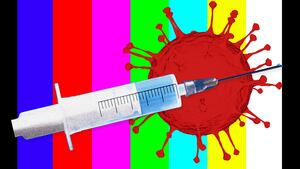Good news, maybe. There’s finally a pill for COVID—and it seems to work pretty well.
Molnupiravir, a co-development of New Jersey-based Merck and Ridgeback Biotherapeutics in Florida, is the first COVID antiviral medication in pill form. Merck and Ridgeback plan to submit their data to the FDA for possible authorization, though it’s unclear how quickly the agency might act. The FDA didn’t immediately respond to a request for comment.
Taken orally, the drug appears to halve the risk of hospitalization and slash the risk of death from serious COVID. “I’m pretty excited about these results,” Leila Hojat, an expert in infectious diseases at University Hospitals in Cleveland, told The Daily Beast.
If data on molnupiravir hold up to scrutiny and the U.S. Food and Drug Administration authorizes it for widespread use, the pill could help relieve the strain hospitals all over America are under as severe COVID cases fill beds and crowd out other patients.
“I am cautiously optimistic that molnupiravir will fill a much needed hole in our current armamentarium of therapies for COVID-19,” Kathleen Chiotos, a pediatrician and researcher at The Children’s Hospital of Philadelphia, told The Daily Beast.
Experts stressed that molnupairavir is not a substitute for the highly effective and safe COVID vaccines that are readily available in the United States. The pill doesn’t prevent infection by, or transmission of, the novel coronavirus.
But if data the Merck and Ridgeback teased on Friday are accurate and repeatable, the new drug could profoundly change how we treat COVID, and save potentially thousands of lives. Assuming it’s affordable, of course.
Molnupiravir is one of at least three pill-based COVID antivirals that are under development by U.S. pharmas. New York-based Pfizer and a consortium of Massachusetts pharma Atea Pharmaceuticals and Roche in Switzerland also have antiviral pills in the works. But Merck is the first to complete large-scale phase 3 trials.
The data from those trials is encouraging, Merck and Ridgeback claimed in a statement. The company tested molnupairavir on 385 non-hospitalized COVID patients while giving 377 patients a placebo. Twenty-eight, or 7.3 percent, of the molnupiravir recipients were hospitalized over the following month compared to 53 (or 14.1 percent) of the placebo patients. Eight of the placebo patients died through day 29, while none of the molnupiravir recpients did—early results that prompted an FDA monitoring committee to stop recruitment into the trial.
The implication is that molnupiravir could cut COVID hospitalizations and slash the death rate. The pill appeared to be broadly effective, even in people with preexisting conditions. “Efficacy was not affected by timing of symptom onset or underlying risk factor,” Merck and Ridgeback reported.
Molnupiravir also appeared to work equally well against all the major COVID variants, including Delta.
Assuming Merck’s data is solid, molnupiravir might be only slightly less effective than monoclonal antibodies, the main existing COVID therapy. The important difference is that molnupiravir is a pill—and potentially inexpensive. Monoclonal antibodies, on the other hand, require an infusion and are both expensive—$2,000 or more per infusion—and in short supply.
There’s another popular COVID therapy, of course: remdesivir. But this drug also requires an infusion and, at around $3,000 per treatment, is even more expensive than the monoclonal antibodies.
Worse, expert opinion on remdesivir’s effectiveness is deeply divided. Some dismiss it as nearly useless.
Today, if you’re unvaccinated and you catch a bad case of COVID, monoclonal antibodies— and maybe remdesivir—might be your best hope for recovery. The problem, besides the cost to you or your insurer, is that you’re going to need the close attention of trained professionals to administer the treatment. And you’re probably going to need a hospital bed.
Those beds are a precious resource. At the height of the ongoing Delta-driven surge in COVID cases a few weeks ago, hospitalizations for the disease peaked at around 100,000. That’s one out of eight hospital beds in the whole country.
In some of the worst-hit cities and states, every bed in every intensive-care ward was occupied by a COVID patient. The bed shortage, to say nothing of staffing shortages, made it all but impossible for people in some areas to get treatment for other serious illnesses. Stories abounded of people dying while awaiting space in a hospital.
A COVID pill is one way to address the hospital overcrowding. “A therapy that reduces hospitalization could also ease the burden on a stressed healthcare system—and potentially do so in populations where access to monoclonal antibodies is limited,” Chiotos said.
Rather than admitting a COVID case for a course of remdesivir or monoclonal antibodies, doctors would prescribe pills and send the patient home. In that way, a cheap COVID pill could save the lives of a lot of people who don’t even have COVID.
There’s also the equity problem. A lot of rural clinics lack the equipment and manpower to administer remdesivir and monoclonal antibodies, even when they have the space. Even the poorest clinic can keep a bottle of pills on hand, however. “This is great news for rural communities and poorer communities that do not have access to infusion centers,” William Hartman, a University of Wisconsin monoclonals researcher, told The Daily Beast.
As a bonus, molnupiravir might slightly reduce a COVID patient’s infectiousness. “Antivirals should work through directly reducing the amount of virus, which should reduce transmission,” Otto Yang, an expert in infectious diseases at UCLA, told The Daily Beast.
But the vaccines greatly reduce transmission. And even if molnupiravir is as effective as Merck and Ridgeback claim it is, it’s no replacement for the jabs, Chiotos said. “It is critical for people to understand that the best way to prevent hospitalization and death from COVID-19 is to get the safe, incredibly effective, and widely available vaccine.”
Compared to existing therapies, molnupiravir and any other possible COVID pills might be better and more affordable for patients—and a godsend for overworked, overfull hospitals. But the only way to end the pandemic is to vaccinate almost everyone.
Do that, and we won’t even need pills.







